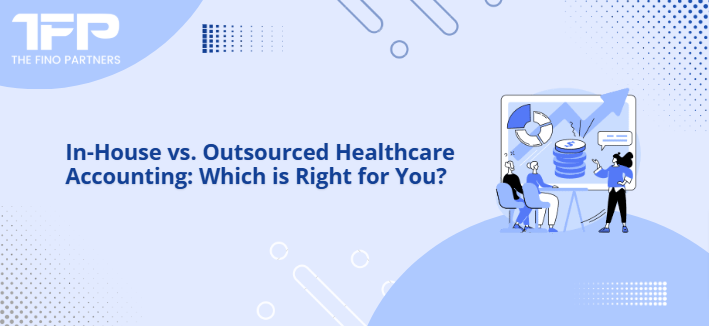Confused about how to balance the budget of your healthcare practice while providing outstanding medical service? Tracking expenses, earnings, compliance & payroll is complex and time consuming. That is exactly why healthcare businesses use healthcare accounting services.
You can manage your books in 2 ways: employing an in house accountant or having your accounting performed by a specialized firm. Both approaches have pros and cons depending on budget, business dimension and needed financial experience.
This article describes the distinctions between outsourced and in-house accounting for healthcare businesses.
What is In-House Healthcare Accounting?
In-house accounting implies you have a part-time or full-time accountant (or maybe a team) handling your financial documents. These employees do everything from bookkeeping to compliance and tax preparation for your practice directly.
Pros of In-House Accounting
If you opt for in-house accounting, here are the main pros of this type of accounting:
1. Direct Control and Oversight
If you have an accountant in your workplace, you can personally oversee his job. Any issues you encounter you can fix them immediately. This control is useful for businesses who prefer to be hands on with their finances.
2. Immediate Availability
An in-house accountant is available during regular business hours. In case you have urgent financial questions, you can obtain answers fast instead of awaiting responses from an outside provider.
3. Familiar with your Business
Your in-house accountant knows your practice inside and out. They understand your finances, recurring expenses and specific revenue cycles - which can assist with long-term planning.
Cons of In-House Accounting
If you opt for in-house accounting, here are the main disadvantages of this type of accounting:
1. High Costs
Hiring an in-house accountant is costly. Industry information puts the average wage for just a healthcare accountant in the U.S. at USD 60,000 to USD 80,000 plus software costs, office space, plus benefits, and year. This is often a major financial burden on medium-sized and small practices.
2. Limited Expertise
One individual accountant (or maybe a little team) might not be an expert on all elements of healthcare financial management, for example tax compliance, revenue cycle management, and insurance billing. If you need a specialist, you might need more people hired.
3. Risk of Errors & Compliance Issues
The healthcare industry has very stringent financial regulations including HIPAA Compliance, Medicare/Medicaid billing laws & tax responsibilities. If your accountant isn't up on all these regulations, a slip might land you in legal trouble with audits or fines.
Outsourced Healthcare Accounting - What Is It?
Outsourced accounting services for healthcare means working with an outsider expert firm which handles fiscal management of health practices, hospitals, physicians along with other medical providers. Rather than bringing in - house accountants, you pay a third party to handle all your accounting from a remote location.
The Pros of Outsourced Accounting
If you opt for outsourced accounting, here are the main pros of this type of accounting:
1. Cost Savings
Outsourcing could save you money. You pay for what you use rather than a full time salary, benefits and office costs. Many hospital accounting outsourcing companies provide flexible pricing models where you scale services by business size and needs.
2. Access to Experienced Professionals
If you outsource, you work together with experts rather than 1 or 2 workers. These professionals offer healthcare and healthcare accounting services, maintaining your practice in line with industry standards, insurance, and tax laws.
3. Advanced Technology and Tools
Accounting firms utilize the most current software for payroll, tax filing, expense tracking and earnings management. That means you do not require old systems or expensive tools.
4. Time-Saving
If you spend hours juggling financial tasks, that is time away from your main business - offering quality healthcare. With outsourcing, you can concentrate on patients and operations while professionals handle your finances.
5. Scalability
Outsourced firms adapt their services as your business expands. Regardless of whether you're a little clinic or a big hospital network, you can expand your accounting support without needing to employ and train new employees.
Cons of Outsourced Accounting
If you opt for outsourced accounting, here are the main cons of this type of accounting:
1. Less Direct Control
If you like constant supervision, outsourcing might be challenging. However reputable healthcare accounting outsourcing services in the USA provide periodic reports and updates.
2. Possibilities for Communication Gaps
With a remote team you will not receive a reply from your accountant as fast as you'd with an in-house employee. But some outsourced firms assign account managers to deal with communications.
3. Service Costs May Vary
While outsourcing is usually cheaper than hiring in-house staff, Costs can vary widely based on the level of service you decide on. Clearly establish your requirements & budget prior to signing any contract.
Which is Best for Your Healthcare Business?
Now that you understand the distinction between in-house and outsourcing accounting, exactly how can you know which is appropriate for you?
|
Which is Best for Your Healthcare Business? |
Choose In-House Accounting If: |
Choose Outsourced Accounting If: |
|
Business Size |
You run a big practice and can afford to hire full-time accountants. |
You manage a medium-sized or small healthcare business and require affordable solutions. |
|
Control Over Finances |
You want full control of financial operations. |
You want access to a team of healthcare accounting experts. |
|
Availability |
You want an accountant on-site during regular business hours. |
You’d prefer to spend your time caring for patients rather than managing cash. |
|
Technology & Cost |
No specific need for advanced technology or software savings. |
You need advanced technology without spending too much on costly software. |
Choose In-House Accounting If:
- You run a big practice and you can afford to hire full time accountants.
- You want full control of financial operations.
- You want an accountant on site during regular business hours.
Choose Outsourced Accounting If:
- You manage a medium-sized or small healthcare business and you require affordable solutions.
- You want access to a team of healthcare accounting experts.
- You'd prefer to spend your time caring for patients than managing your cash.
- You'll need advanced technology without spending too much on costly software.
Consider a Hybrid Approach
Some healthcare businesses combine both these practices by keeping basic financial tasks in-house and outsourcing more complicated accounting functions including tax planning, compliance, and payroll. This blended approach gives control with the ability to access outsourced expertise when required.
Final Thoughts
Your healthcare business needs accurate financial management to stay compliant and profitable. Whether you go with in-house accounting or outsourcing, it should at last depend on your budget, business size and objectives.
Looking for the best healthcare accounting services which provide expert assistance at a competitive price? With skilled professionals, advanced technology and flexible solutions, outsourcing lets you concentrate on patient care and your financial stability.
Need expert financial management for your healthcare business? Call The Fino Partners today to discuss custom accounting solutions for you.




























